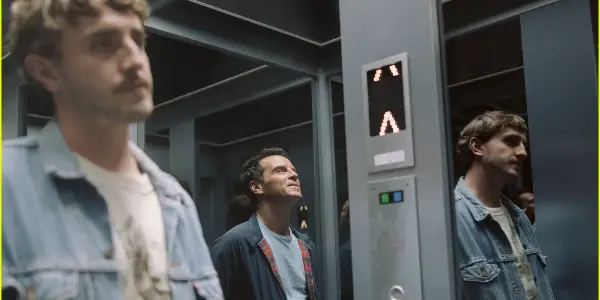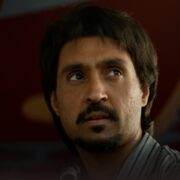New York Film Festival 2023: ALL OF US STRANGERS

Will Bjarnar is a writer and video editor based in…
Is Andrew Haigh okay? Silly question: Of course he isn’t, he’s a filmmaker. An auteur, at that, perhaps the most tortured kind of filmmaker, the type to say, “Hello, world, enjoy my soul, I’ve ripped it out and have chosen to project it onto a large screen for your enjoyment.” And honestly, though I feel bad about it, I’m not sure I want Haigh (or other masters like him) to find peace, because gosh, what art they make when delving into the deepest parts of themselves in order to tell the best stories.
The stories Haigh typically tells are thoughtful journeys into the souls of his characters, but with his latest, All of Us Strangers, he’s turned his camera on the most literal possible embodiment of the soul: ghosts. Well, sort of. The kind of ghost you’re probably used to doesn’t appear here; there aren’t any floating, see-through spirits populating the landscape, spooking his characters with chills down their spines. Instead, Haigh gives us a delicate melancholic tale about the people that leave us behind when they’re gone and those that remain in our foreground, helping us to pick up the pieces. That is, if we’ll let them.
Loneliness
You would be forgiven if you felt as though a ghost story was a curious choice for Haigh, given what audiences are prone to expect from the United Kingdom’s foremost author of fully-realized romantic dramas this side the recently-late, great Terence Davies. Yet given the particular ghost story he’s elected to tell in All of Us Strangers, you’ll likely feel foolish for having been a skeptic at all — it’s as tender a tale as Haigh’s ever brought to the big screen, lofty praise for the man behind Weekend and 45 Years. The film is an uber-loose adaptation of Taichi Yamada’s 1987 novel, Strangers, a work that Haigh has admittedly spent some time circling, and has carefully altered in ways that serve the sensitive sensibilities often found at the core of the director’s best works. Say goodbye to some of the more supernatural horror elements of the source text, and hello to a story queered in a way few filmmakers other than Haigh could achieve.

Adam (Andrew Scott) is a lonely screenwriter living in a London high-rise that appears to only be populated by one other tenant, a slightly younger man called Harry (an impish, winsome Paul Mescal). The two meet while Adam seems to be at his most lost – taunted by Word documents as vacant as the building he and Harry solely occupy, by memories of a simpler, if not totally happier time when he was a child. When Harry first approaches Adam, the latter is quick to reject the former’s drunken advances; he has to return to the script he can’t (or won’t) work on, and a TV that only plays music videos, though nothing released after the heyday of Fine Young Cannibals and Pet Shop Boys. But Adam thaws, albeit gingerly, and he and Harry begin a steamy courtship it seems they both are in need. Loneliness is a cruel, powerful drug; so, too, is love.
It’s that loneliness that sends Adam back to his old home just outside London, perhaps in an attempt to mine inspiration for his semi-dormant screenplay, but more likely to try to feel something. He stands outside, gazing off at those old, recognizable shutters, the street on which he grew up. On that same trip, he encounters his long-dead father (Jamie Bell) – as Adam tells Harry later on, his parents died in a car accident when Adam was 12 – who, as though time has stood still for the better part of three decades, invites Adam back to their family’s home for dinner. Adam’s mother (Claire Foy) awaits behind the screen door when they arrive, greeting him like a child who was missed, but more so because he had moved out of town, or off to school, not because he’d lost his parents when he was merely a boy.
Father and Son
Each party seems to know why they haven’t seen each other in 35 years, as well as the fact that it’s curious that they’re seeing one another now. But Haigh is wary of bringing any needless attention to those“whys”, a tactic that allows the narrative to remain invested primarily in Adam’s healing process in the present, not a time-jumping saga one can imagine a lesser filmmaker attempting to conjure. Sure, that’s another way of saying that Haigh skirts telling you why Adam’s parents have reentered his life, but to do so would almost certainly sour a story that otherwise unfolds with a seamless comfort that envelopes its viewer, even when it flogs for the emotional jugular. This is an elegiac and graceful journey not between periods in time, but by definition, between continuums: the adjacent elements of Adam’s experiences in a life of the past and one of the present, are not plainly different from each other, while the extremes are distinct.

That each of the film’s four principal actors manage to capture these extremes in such a way that ensures they aren’t disjointed from the film’s overall conceit is an individual masterclass from everyone on down. Scott is sure to rightfully receive the most buzz for his turn, given how adeptly he both carrie’s the film’s sentimental fulcrum and juxtaposes Adam’s most pensive adult moments with his most hopeful (and hopeless) ones as a man-child, and Mescal is more whimsical than he’s ever been, carrying a role that gets heavier as story unfolds with a feather-light, seductive bravado.
But it’s the connection between Bell and Scott – a father trying to use the limited time he has to do right by the son he hardly got to know before he was gone – that serves as the principal standout from a film chock full of them. Bell‘s Dad doesn’t exactly navigate the most important conversations he and Scott’s Adam have with grace, though how could he? He’s a father stuck in 1987 attempting to understand his lonely, somewhat-reticent — and also gay — son 35 years after he left him behind. That the two actors forge a bond as believable as this result is a testament to Haigh’s belief in his story and his performer’s ability to bring it to life in a proper fashion. Given that Bell is close to a decade younger than Scott can’t have made this a simple feat, yet these actors manage to do what might be impossible with a lesser production: they make us believe.
Conclusion
Your mileage on Haigh’s approach may vary; All of Us Strangers is a film that asks its audience to give up a lot – control, logic, the science of reason. But what it gives back in intellect and emotional vigor is tenfold. What Haigh is best at as a filmmaker is the craft of rendering the significance of what is left unsaid through other acts, whether it be passionate physical contact or longing gazes.
Here, he continues his streak with both, yet adds a third dynamic, that of a parent-child relationship told through the lens of loss, something he proves to be just as capable of capturing, if not more so. It’s clear from the beginning that, despite its unexplained presence, Adam’s time with his parents won’t last forever, and the manner in which Haigh lets it unfold until its tear-jerking conclusion is both as elegant and as natural as Adam’s initial re-introduction to his mom and dad. It’s not forced upon you, but merely broached as a heartbreaking inevitability.
This is exactly what it felt like for me as an audience member when the credits rolled: a heartbreaking inevitability, the conclusion of a story I could’ve watched unfold and wind through channels unknown for days, perhaps, nevermind the emotional turmoil that would cause. For what Haigh has given us with All of Us Strangers is a gift of a film, a dream that we’re lucky enough to peer in on through teary eyes. Ultimately, though, it’s a therapeutic experience, the sort of art you think about well after it’s left your gaze, as it can’t leave your mind even if you tried to force it out. And why would you? Take the words of another Britpop staple, Eurythmics, as gospel: “Sweet dreams are made of this.” Who are we to disagree?
Does content like this matter to you?
Become a Member and support film journalism. Unlock access to all of Film Inquiry`s great articles. Join a community of like-minded readers who are passionate about cinema - get access to our private members Network, give back to independent filmmakers, and more.
Will Bjarnar is a writer and video editor based in New York City, who spends his days as a full-time film obsessive/completist, his nights as an insomniac feeding said obsession, and his Sundays as a long-suffering Buffalo Bills fan. Follow him on Letterboxd for musings on films old and new, and read his work on a litany of sites for musings far more eloquent than the ones you'll find there.













